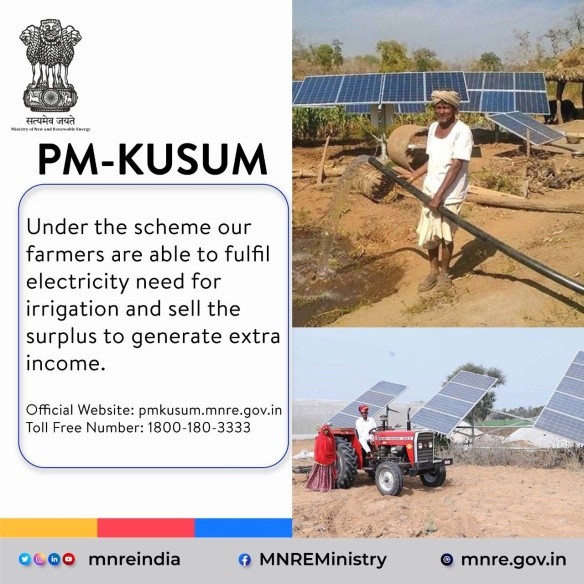Types of solar scheme
1. Pradhan Mantri Kisan Urja Suraksha evam Utthaan Mahabhiyan (PM-KUSUM):

PM-KUSUM is a flagship scheme launched by the Government of India to promote the installation of solar PV panels and other renewable energy-based decentralized power generation systems in rural areas. The scheme aims to provide financial and irrigation support to farmers by incentivizing the installation of solar pumps, grid-connected solar power plants, and solarization of existing agricultural pumps. It also encourages the adoption of solar PV technology for generating power and income for farmers.
2. Jawaharlal Nehru National Solar Mission (JNNSM):
JNNSM, also known as the National Solar Mission, is one of the most significant initiatives launched by the Government of India to promote solar energy deployment in the country. Launched in 2010, the mission aims to achieve 100 GW of grid-connected solar power capacity by 2022. It includes various schemes and programs such as rooftop solar, utility-scale solar parks, off-grid solar applications, and solar manufacturing incentives to support solar PV installation and development across India.

3. Atal Solar Krishi Pump Yojana (ASKP):

ASKP is a solar pump scheme launched by the Government of India to promote the adoption of solar-powered irrigation pumps in agricultural sectors. Under this scheme, farmers are provided with subsidies and financial assistance to install solar PV-based pumps for irrigation purposes. The scheme aims to reduce the dependency on conventional diesel or grid-connected pumps, improve energy efficiency in agriculture, and enhance farmers' income by reducing electricity costs.
4. Grid Connected Rooftop Solar Programme (GCRTSP):
The Grid Connected Rooftop Solar Programme is an initiative launched by the Ministry of New and Renewable Energy (MNRE) to promote the installation of solar PV systems on rooftops of residential, commercial, industrial, and institutional buildings. The program offers financial incentives, subsidies, and net metering facilities to encourage consumers to install rooftop solar panels and generate their electricity. It aims to increase the share of solar energy in the country's energy mix, reduce carbon emissions, and promote energy self-sufficiency.

5. Surya Mitra Scheme:

The Surya Mitra Scheme is a skill development program launched by the Ministry of New and Renewable Energy (MNRE) to train manpower in the field of solar energy technologies. Under this scheme, training is provided to unemployed youth, technicians, engineers, and professionals to develop their skills in solar PV installation, operation, and maintenance. The program aims to create a skilled workforce capable of supporting the rapid deployment and growth of solar energy projects across India.
These yojanas demonstrate the Government of India's commitment to promoting solar PV installation and harnessing solar energy to meet the country's energy needs, drive rural development, create employment opportunities, and mitigate climate change.